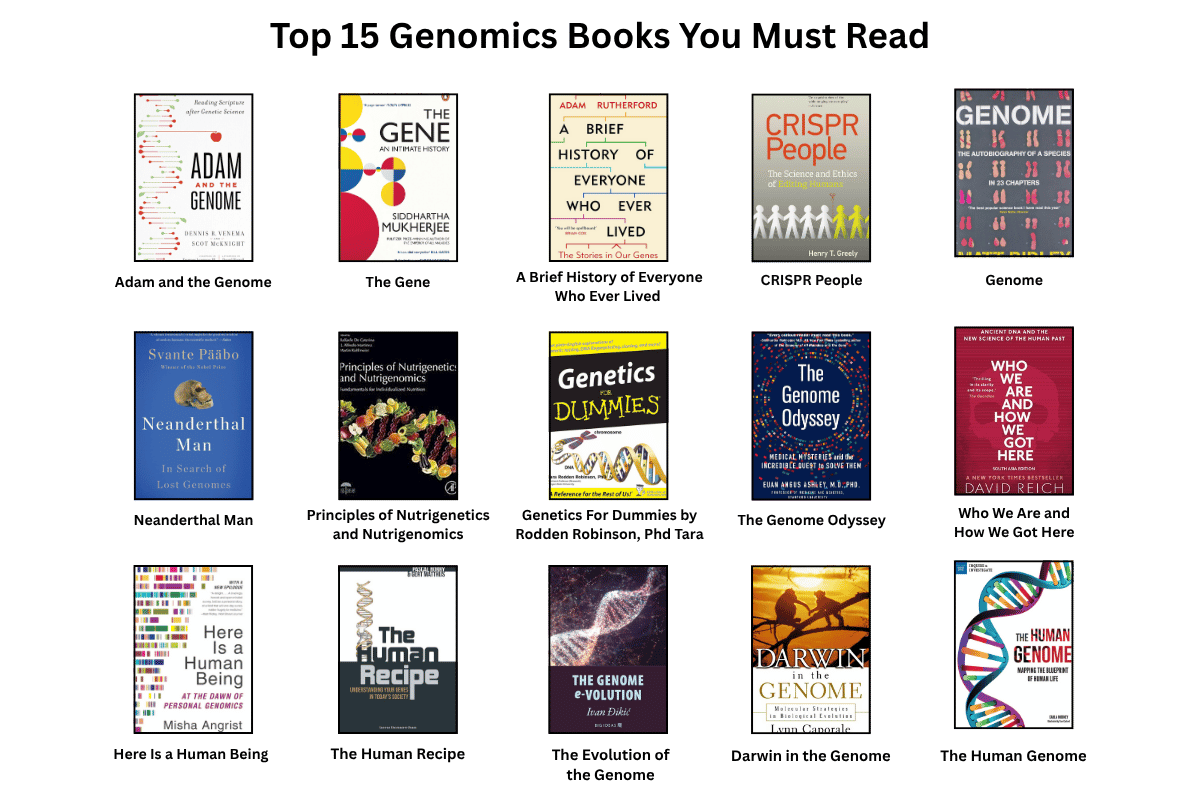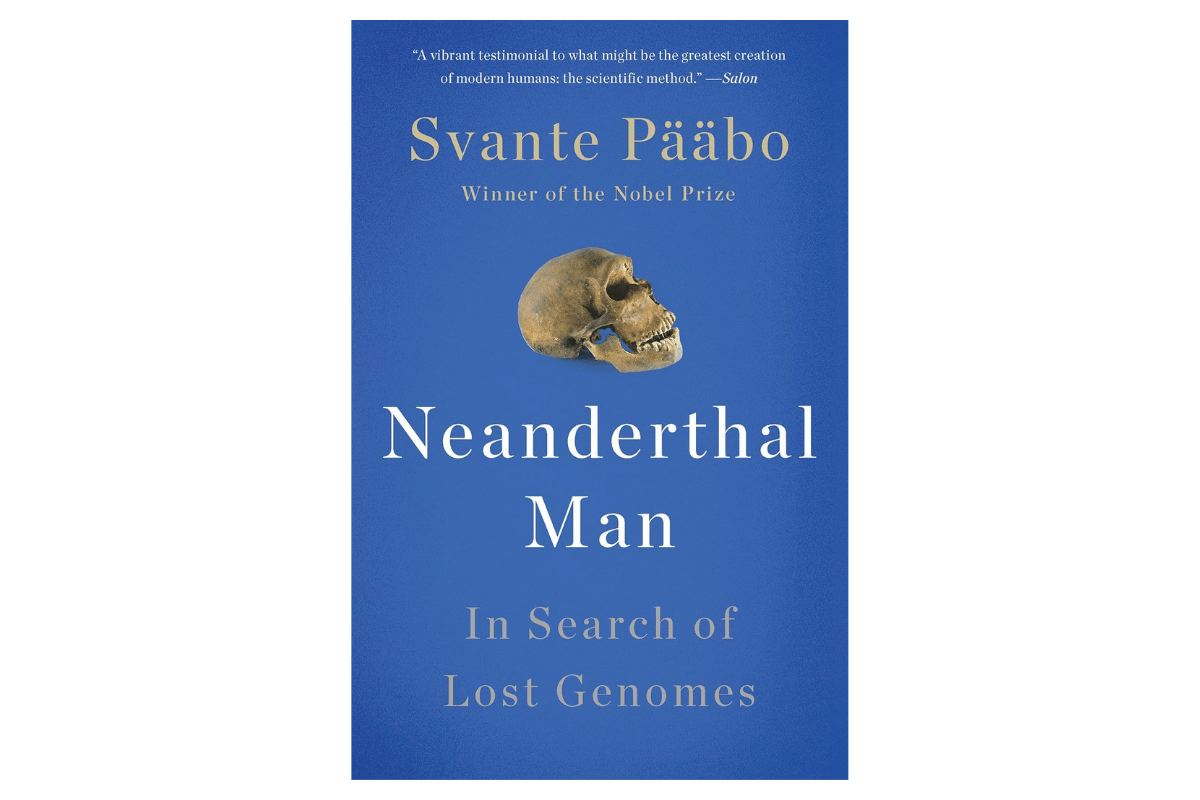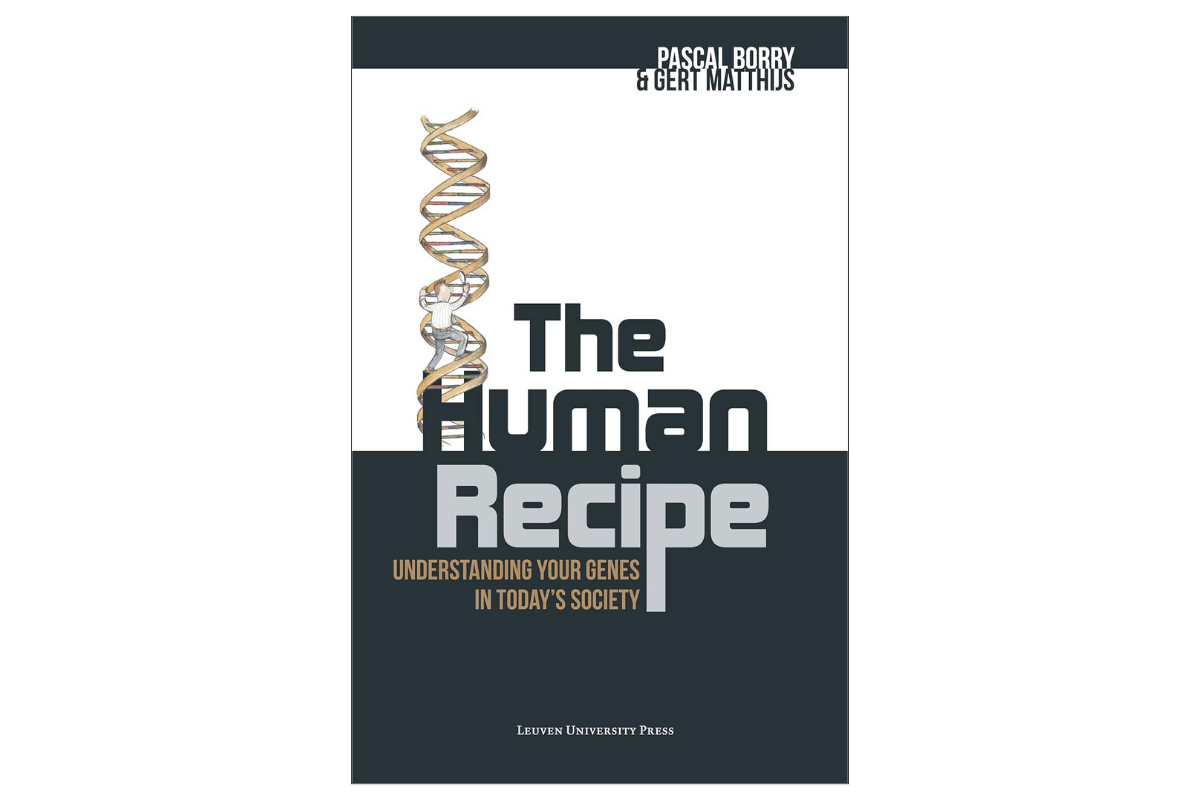From decoding the puzzle of our ancestral lineage to revealing the potential of personalized medicine. There have been many changes that were written not in the stars but in the code of life itself.
Consider a future where diseases can be foreseen before they are noticeable, where treatments are designed to your unique biological blueprint, and where the essential code of existence is an open book.
This is not science fiction, but it is a limitless field of genomics that is reshaping our understanding of who we are and what is possible.
For those eager to get started on this extraordinary journey of discovery, to explore the complex language of DNA, and to understand the genetic breakthroughs. There’s a treasure chest waiting that is filled with extraordinary Genomics Books.
In this article, we will go through a well-curated list of these extraordinary books, holding the knowledge of our unique biological blueprint.
Top 15 Genomics Books You Must Read:

1. Adam and the Genome: Reading Scripture After Genetic Science by Dennis R. Venema and Scot McKnight
- Why It Stands Out: It bridges the gap between modern genetic science and Christian theology, challenging traditional views on Adam and Eve with clarity and respect.
- Who It’s Best For: Readers interested in the intersection of faith, science, and biblical interpretation; especially theologians, pastors, and science-informed Christians.
“Science and Scripture need not be enemies—they can be conversation partners.”
2. The Gene: An Intimate History by Siddhartha Mukherjee
- Why It Stands Out: A masterful blend of science, history, and personal narrative that makes the complex story of genes deeply human and compelling.
- Who It’s Best For: Science enthusiasts, medical students, and anyone curious about the genetic code that shapes our lives.
“Every scientist is a descendant of a narrative.”
3. A Brief History of Everyone Who Ever Lived by Adam Rutherford
- Why It Stands Out: A witty, science-packed journey through human evolution using DNA to decode history, myths, and identities. One of the most interesting Genomics Books.
- Who It’s Best For: Curious readers who enjoy accessible science writing and want to explore how genomics reshapes our understanding of ancestry and civilization.
“Genetics is not the story of how you are unique. It is the story of how you are connected.”
4. CRISPR People: The Science and Ethics of Editing Humans by Henry Greely
- Why It Stands Out: Explores the real-life case of the first gene-edited babies and dives deep into the legal, ethical, and scientific consequences.
- Who It’s Best For: Ideal for bioethics enthusiasts, science policy students, and readers interested in the societal impact of gene editing.
“We are not ready—not scientifically, ethically, or legally—to make inheritable edits to human beings.”
5. Genome: The Autobiography of a Species In 23 Chapters by Matt Ridley
- Why It Stands Out: Each chapter explores a different human chromosome, blending science with storytelling to decode our genetic blueprint.
- Who It’s Best For: Curious readers, science enthusiasts, and beginners who enjoy accessible, narrative-driven science writing.
“Genes are not puppet masters, nor blueprints. They are ingredients in a recipe, not commands.”
6. Neanderthal Man: In Search of Lost Genomes by Svante Pääbo

- Why It Stands Out: A firsthand account by the scientist who sequenced the Neanderthal genome; blending groundbreaking science with personal narrative.
- Who It’s Best For: Consider one of the most unique Genomics Books; this is for readers interested in human evolution, ancient DNA, and behind-the-scenes scientific discovery.
“We had brought a genome back from the dead—and it would change how we saw ourselves forever.”
7. Principles of Nutrigenetics and Nutrigenomics
- Why It Stands Out: A comprehensive guide bridging nutrition and genetics, offering evidence-based insights into how genes influence dietary responses.
- Who It’s Best For: Ideal for nutritionists, medical professionals, genetic researchers, and advanced students in health sciences.
“Personalized nutrition, informed by genetic makeup, is the frontier of preventive health.”
8. Genetics For Dummies by Rodden Robinson, Phd Tara
- Why It Stands Out: Breaks down complex genetic concepts into fun, relatable explanations, perfect for non-scientists.
- Who It’s Best For: Beginners, high school/college students, or anyone curious about genetics without the jargon.
“DNA is like a recipe book—some recipes are used often, others rarely, but all contribute to the final dish: you.”
9. The Genome Odyssey: Medical Mysteries and the Incredible Quest to Solve Them by Euan Ashley
- Why It Stands Out: A real-world journey through groundbreaking genome sequencing used to solve rare medical mysteries, told by one of the pioneers in genomic medicine.
- Who It’s Best For: Ideal for curious readers, med students, and healthcare professionals interested in the intersection of genetics, diagnostics, and patient stories.
“Every genome has a story to tell, and every story has the potential to change a life.”
10. Who We Are and How We Got Here by David Reich
- Why It Stands Out: Reich uses cutting-edge DNA analysis to reveal surprising truths about ancient human migrations and ancestry, challenging traditional views of race and identity.
- Who It’s Best For: Ideal for readers curious about human evolution, genetics, and the science behind our shared origins.
“Mixture is fundamental to who we are, and we should embrace it.”
11. Here Is a Human Being: At the Dawn of Personal Genomics by Misha Angrist
- Why It Stands Out: A rare personal take on the genetic revolution; Angrist, one of the first to have his genome sequenced, explores the promises and perils of personal genomics.
- Who It’s Best For: Curious readers, science enthusiasts, and anyone interested in the human side of DNA science.
“Our genomes may be maps, but they are maps without a key, and we are just learning how to read them.”
12. The Human Recipe: Understanding Your Genes in Today’s Society by Gert Matthijs and Pascal Borry

- Why It Stands Out: It brilliantly connects genetics with social and ethical issues, making complex science accessible and relevant to everyday life.
- Who It’s Best For: Ideal for curious readers, policy enthusiasts, and students exploring the intersection of genomics, ethics, and society.
“Genes are not our destiny, but they are powerful ingredients in the recipe of who we are.”
13. The Evolution of the Genome
- Why It Stands Out: A comprehensive and scholarly deep dive into genome structure, function, and evolution, perfect for readers seeking advanced insights.
- Who It’s Best For: Graduate students, researchers, and professionals in genetics, molecular biology, or evolutionary biology.
“Genomes are not static entities, but dynamic systems shaped by complex evolutionary forces over time.”
14. Darwin in the Genome by Lynn Helena Caporale
- Why It Stands Out: It connects Darwinian evolution with molecular biology, exploring how genetic variation isn’t entirely random but influenced by genome dynamics.
- Who It’s Best For: Readers interested in evolutionary biology, genomics researchers, and advanced science enthusiasts.
“The genome does not just allow variation; it encourages it, directs it, and responds to it.”
15. The Human Genome: Mapping the Blueprint of Human Life by Carla Mooney
- Why It Stands Out: A concise and engaging introduction to the science and history behind the Human Genome Project, written in an accessible style for younger audiences.
- Who It’s Best For: High school students, curious teens, and beginners seeking a clear overview of genomics.
“Unlocking the human genome is like finding the instruction manual for building and operating a human being.”
Reading these genomics books will offer a distinct experience, which will trigger your curiosity and help expand your beliefs and knowledge.
Similar Article:
- You Can’t Miss These 25 Must-Read Medical Books
- 20 Pharmaceutical Industry Books That Cover Everything You Need to Know
- What’s Inside? Sneak Peeks at the Best Life Sciences Books of the Year
Conclusion
From working to uncover our shared genetic past to working to change the future of personalized medicine, genomics is reshaping the story of life.
The Genomics books featured here aren’t just a collection of facts; they are an invitation to explore what makes us unique humans. No matter whether you are a student, researcher, or just a curious reader. You will find something on this list to expand your imagination and understanding.
FAQs:
1. Who is the father of genomics?
Frederick Sanger, ‘the father of genomics’, was one of just four scientists to win two Nobel prizes and the only one to receive both in chemistry.
2. What is the most difficult topic in genetics?
Transcription, translation, and DNA replication, especially when placing these processes in the context of the bigger picture.
3. Who is the leading genomics company?
Illumina is known as one of the world’s leading providers of NGS for DNA and RNA.







